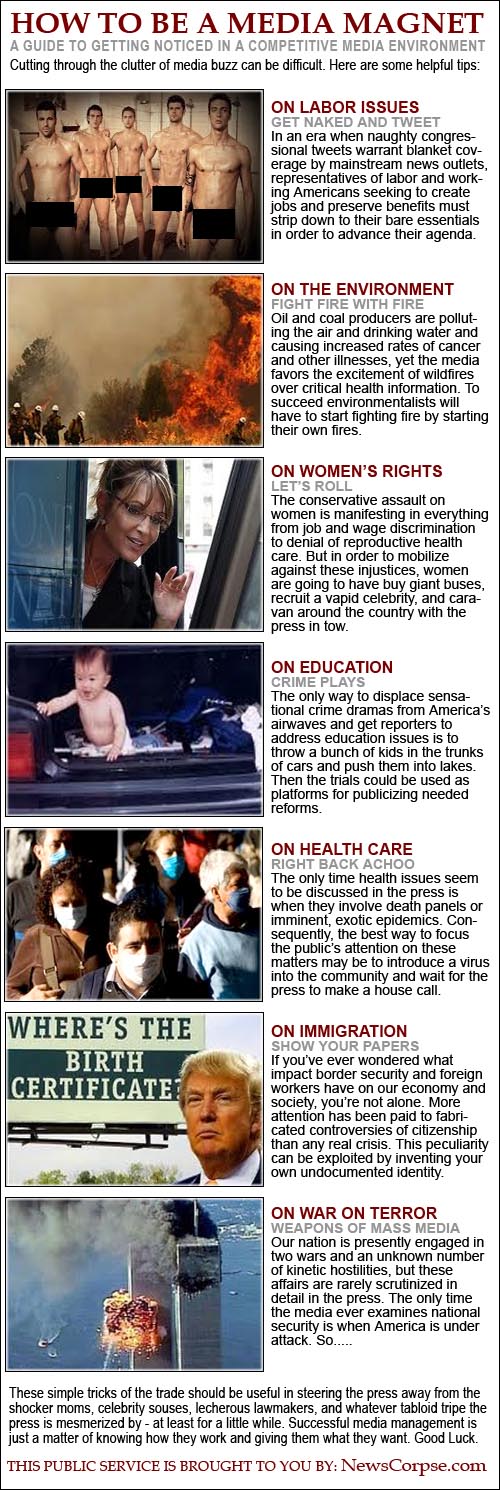The state of contemporary journalism is widely regarded as defective by consumers and critics representing a broad diversity of opinion. It seems that the media has no constituency defending its professional lethargy and its reliance on sensationalism and melodrama.
The past few weeks have provided comprehensive instructions on how to be an utterly frivolous and ineffective news industry. When Americans are desperate for information about pressing issues concerning jobs, the economy, health and Medicare, and national security, they are left wanting as the major news enterprises dump loads of salacious gossip, celebrity gaffes, and lurid tales of criminal miscreants. Just trying to be heard over the caterwaul of crapola that passes for news is an Olympian feat. If it isn’t a lewd lawmaker (Anthony Weiner) flooding the airwaves, it’s a murderous mom (Casey Anthony), one of thousands of murderers, but the only one that seems to garner any attention.
Recent surveys have shown that the media is not covering the issues that the people are most interested in. The audience has made its preference clear: they want substance, not sleaze. But the media tone-deafness was demonstrated exquisitely when all three cable news networks cut away from Nancy Pelosi, the Democratic Leader of the House of Representatives, after she informed them that she would only be addressing questions regarding jobs and the economy, and not Rep. Weiner. As is becoming routine, a non-news personality summed it up best by playing a video clip of CNN’s Wolf Blitzer expressing his reluctance to cover the titillating trivialities of the day:
Wolf Blitzer: We’ve covered these kinds of stories, It’s not a pleasure for us. It’s not something we look forward to. I’d much rather be discussing economic issues, jobs, the future of Medicare, national security issues, than talking about this.
Jon Stewart: [Incredulously] What’s stopping you?!
In an effort to enhance the public’s access to the stories that actually impact their lives, I am offering this tutorial on how to get appropriate coverage of the critical matters that face our nation. It is not enough to be brilliantly articulate about a position or to make a coherent case for a policy. You must grab the attention away from the media whores and their enablers in the press corps. Here is how to do just that in a handy shareable infographic guide:

Now get out there and make some news.


To be serious for a moment, CNN management probably did “stop” Blitzer from reporting important stuff. To be fair, I doubt he raised much of a stink about it.
My favorite instance of insisting one has no choice is courtesy of L. O’Donnell, who used the Soprano line “just when I think I’m out they drag me back in” in regard to the Weiner scandal. In this case I doubt Lawrence couldn’t have gotten away with ignoring it, considering the rest of MSNBC would have more than compensated for his boycott with its own over-coverage.
The problem with bigtime journalists is that their professional status immunizes them from the consequences of important stories particularly involving the economy. It’s one of the many reasons, I believe, that the alternate press, personally affected, has become superior to the traditional types.
To be clear, O’Donnell’s Sopranos reference was made after the story broke and he obediently covered it, but had died down only for there to be new developments he then had no choice but to cover as well. I don’t remember whether the information was the wife’s pregnancy, her return from abroad, the even dirtier pictures, another press conference, constituency polls, or whatever, though I do resent knowing these bits and pieces because of the media’s relentless determination to spread them throughout the public sphere whether the audience gave a damn, or (decidedly) not.
Every anchor has some mix of editorial discretion and pressures from bosses and ratings concerns. But this isn’t just a question of whether to cover or not. It’s about the quantity of coverage. I have no problem some tabloid-style stories being reported. The problem is when they shove everything else off the air. A couple of weeks ago it was Weiner. Now it’s Casey Anthony. Why is that case so important?
It’s the quality of coverage, it’s the quantity of coverage, it’s what gets covered. I had no idea the Anthony case was getting so much, though I did come across one of those MSNBC Friday night canned documentaries on it after Rachel last week. While I do somewhat enjoy the crime show treatment – 48 Hours featured it recently – I don’t appreciate it crowding out other, more relevant to the public issues on news networks. And then there’s the matter of why Anthony? why Peterson? The attractive white people feature is more inherently appealing?
To your point, of course you’re correct that Blitzer could have insisted on turning his focus on actual matters instead of complaining about restraints. It was just a disingenuous lament.